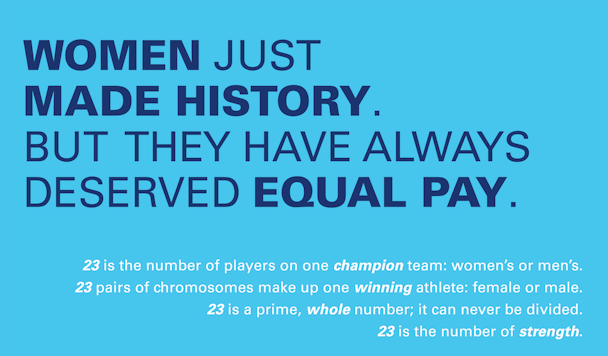USWNT sponsor P&G takes out full-page Times ad to demand equal pay in soccer
Procter & Gamble's Secret Deodorant has publicly taken a stand against the pay disparity between the men’s and women’s teams in US Soccer, publishing an ad in the New York Times questioning the current financial status quo.

P&G took out a full-page ad in the New York Times to publicise its cause
The company used its platform as a sponsor of the World Cup-winning women’s team not just to celebrate the side's achievement but to continue its fight for equal pay.
According to a lawsuit filed by 28 members of the USWNT against the US Soccer Federation in March, female professional footballers in the States are only paid around 38% of their male counterparts’ salary.
The statistic loomed large over USWNT’s successful international season, with chants for “equal pay” echoing through the stadiums in France even as the team lifted the trophy. The sporting federation has since agreed to pursue mediation talks in the coming months.
Now, Secret has become one of the side’s first corporate sponsors to put its backing of the equal pay cause in writing.
The brand took out a full-page, long-form copy ad in the New York Times yesterday (15 July) led by the heading ‘Women just made history. But they have always deserved equal pay.’
The copy read: ‘...we know strength is more than just overcoming what makes us sweat. It’s recognizing inequality and working to rectify it. It’s being true to yourself and your principles. It’s learning from what’s wrong and what’s right.’
The brand used the print ad to pledge $529,000 to the USWNT Players Association – $23,000 for each of the 23 players on the World Cup squad – in order to combat pay disparity between the winning side and the less successful male team.
The ad continued: ‘We urge the US Soccer Federation to be a beacon of strength and end gender pay inequality, once and for all, for all players. And we urge you, our fellow fans, friends, supporters, organizations and brands: join our team and help close the gender pay gap.’

The strategy, which has drawn considerable media coverage, is congruous with P&G’s ongoing #WeSeeEqual campaign. First unveiled on International Women’s Day 2017, the initiative aims to advocate for gender equality across all P&G properties.
Meanwhile, Secret has already proven itself as a campaigner for fair pay across genders. Last year saw the deodorant brand launch ‘I’d Rather Get Paid’, a film that used the voices of celebrities such as Sophia Bush and Samira Whiley – as well as soccer player Abby Wambach – to highlight the fact American women are still paid 20% less than men on average.
USWNT co-captain Megan Rapinoe called for sporting sponsors to do more to address issues such as equal gender pay in an interview with NBC’s Meet The Press yesterday.
“These are some of the most powerful corporations, not just in sports but in the world and have so much weight that they can throw around,” said the forward. “And I think that they just need to get comfortable throwing it around.”
She added pay-based discrimination was a “complicated issue”, but one that might be easily solved when “big sponsors can just write the check”.
Elsewhere, Visa has promised “at least” 50% of the investment tied up in its five-year partnership with the US Soccer Federation to USWST and women’s soccer programs.
Luna Bar, a food brand produced by Clif, also promised each member of the women’s World Cup team a bonus of $31,250 – a figure it said was the difference between the women’s and men’s World Cup roster bonuses.

